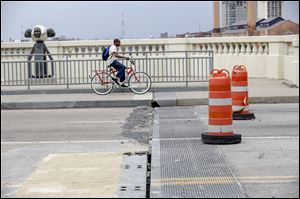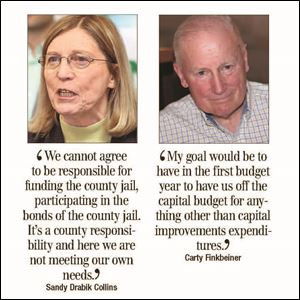
Likely mayoral hopefuls roll out ideas to fix roads
Stop raiding capital improvements, some say; tax raise called last resort
6/16/2015

A bicycle passes where crews from City of Toledo Streets, Bridges & Harbor began to fix four expansion joints on the Martin Luther King, Jr. Bridge in Toledo. The fixed is forefront left. What needs fixed is back left (crumbling concrete).
Toledo’s mayoral candidates and potential candidates have offered a variety of solutions for fixing the city’s deteriorating streets, most of which call for an end to draining the city’s capital improvements fund to support its daily operating fund.
Toledo has a special election Nov. 3 to elect a new mayor to serve the two years remaining in the term of the late Mayor D. Michael Collins, who died in February.
The declared candidates, as well as several who are considering a run for mayor, were asked to detail their plans to address the city’s $1.3 billion in street repair needs.
According to a special report in The Blade on Sunday, the city should be spending at least three times as much as its current budget of less than $20 million on street resurfacing and reconstruction.

Mayor Paula Hicks-Hudson, the endorsed Democrat in the election, is the former city council president who became mayor when Mr. Collins died. She said much of the $64 million annual need cited by Doug Stephens, the city’s commissioner of engineering services, is focused on state roads, which are substantially paid for by state and federal funds.
“I’m looking at residential streets,” Ms. Hicks-Hudson said. “The problem we’re facing is how do we attack the residential streets. That’s the real challenge.”
RELATED ARTICLES:
Routine maintenance is ignored, creates backlog
Toledo’s bumpy streets amount to a $1.3B mess
She said she’d like to spend an additional $8 million a year on resurfacing and repair, or about $1.25 million per council district. But she doesn’t have an immediate plan for generating that revenue.
“The last resort would be possibly looking at some kind of increase in our revenue. I want to look to the state and ask for a way to release some of their surplus at the state level. The reason we’re in this situation is the reduction in local government funds,” she said. The state has a rainy-day fund of $1.5 billion, officials said.
The mayor said she does not envision ending the practice of transferring money from the city’s capital improvements fund into the general fund anytime soon. In 2010, the city took $7 million from the capital improvement fund created with revenue from the 0.75-percent temporary income tax that was originally earmarked for capital improvements to maintain city services. From 2011 through 2014, the city took $14 million from the fund and this year, the borrowing from the capital budget is planned at $11 million.
City officials have made efforts to eliminate the need to borrow from the fund. For instance, the mayor said a pavement-milling machine the city bought in 2013, with another one to be delivered this summer, has been helpful.
“There has been a lot of I’ll call them work-arounds. The department is looking at ways to try to address this problem within the funding limitations that we have,” Ms. Hicks-Hudson said.
Raising revenue through a tax increase would be a last resort, she said.
“We’ve got to show we’re good stewards and try every alternative,” Ms. Hicks-Hudson said.
Sandy Drabik Collins, Mr. Collins’ widow who is running for mayor as an independent, said the solution is going to take improved financial management and getting away from using capital improvement funds.
“We need a true pavement-management system. We need to approach it in an orderly manner to get the most life out of our roads,” Mrs. Collins said.
A former director of administrative services under Gov. George Voinovich, Mrs. Collins said she would retain the goal set by her husband of lowering the city’s reliance on the capital improvements budget to zero by the end of 2017.
She also would resist making the city responsible for helping to pay for a new Lucas County jail.
“We cannot agree to be responsible for funding the county jail, participating in the bonds of the county jail. It’s a county responsibility and here we are not meeting our own needs,” Mrs. Collins said.
“I do believe we need to look at borrowing money, and by that I mean selling bonds. We need to be very careful not to increase our debt load beyond our ability to pay,” Mrs. Collins said.
Opal Covey, an evangelist and the only other declared mayoral candidate, said she would turn Toledo into a vacation destination and end corruption.
“I don’t like borrowing. I will pursue grants, plus me building this as the vacation city and getting people in here, it will build up our funds,” Ms. Covey said.
She said her plan for putting an amusement park on Promenade Park, instead of turning it over to ProMedica for a headquarters, would fuel a tourism surge that would generate ample tax revenues.
“We would be able to fix the streets in the first year,” she said. “I am receiving it from God that [Promenade Park] was already taken by God for an amusement park and that the ProMedica thing is going to fall through.”
Former Mayor Carty Finkbeiner had a two-pronged prescription: no capital improvements dollars for anything but road improvements starting as soon as 2016, and instituting a regional metropolitan government that would allow the county or region to help share the costs.
“We will repave 40 street miles annually. I’m going to ask a team of businessmen, bean-counter types, to take a look at the city budget immediately upon election night results and ask them to have in my possession as quickly as they can, but not later than 90 days, recommendations as to how and where the city budget is capable of being reduced. My goal would be to have in the first budget year to have us off the capital budget for anything other than capital improvements expenditures,” Mr. Finkbeiner said.

Regional approach
“Ultimately I do believe we have to have a regional approach to solving the roads problem,” Mr. Finkbeiner said.
Mr. Finkbeiner, who is actively campaigning but hasn’t declared himself a definite candidate, said the condition of the city’s roads has been worsening since 2010, when Toledo voters agreed to allow one-third of the revenue from the 0.75-percent temporary income tax, which was previously earmarked for capital improvements, to be used for daily operations.
He opposed an earlier attempt in 2009 to divert money from the capital improvements portion of the temporary tax, predicting “drastic cuts to our streets.”
Mr. Finkbeiner said the necessity for borrowing from the capital budget is largely because of the city’s overtime bill, which he said points to managers not doing their jobs.
Toledo at-large Councilman Rob Ludeman, who is considering entering the mayoral contest, said he hopes the improved economy helps Toledo gain the necessary revenues. He said the problem was caused by “the worst economy in my lifetime,” two harsh winters in a row, and the state slashing local government funds.
“We need to shift away from using CIP dollars in the general fund and make sure we have those funds for street repaving. We need to be more aggressive in working with the state for grants,” Mr. Ludeman said.

Weaned by now
Former Mayor Mike Bell, who also is undecided about running for mayor again, said the city should have been weaned by now off the diversions from the capital improvement budget that began in his first year as mayor, 2010.
“The reason we got into borrowing was we didn’t want to eliminate basic services. It was a risk, but it’s one that I think has paid off,” Mr. Bell said. “The whole intent from my administration was to wean ourselves and be, by now, off of it.”
He said Toledo needs more revenue to improve its infrastructure, and that’s a decision only Toledo taxpayers can make.
“There’s no way you can fix that without having more money put into the system,” he said. He also said the federal government should provide some help to older cities that have aging infrastructure.
Staff Writer Ignazio Messina contributed to this report.
Contact Tom Troy: tomtroy@theblade.com or 419-724-6058 or on Twitter @TomFTroy.